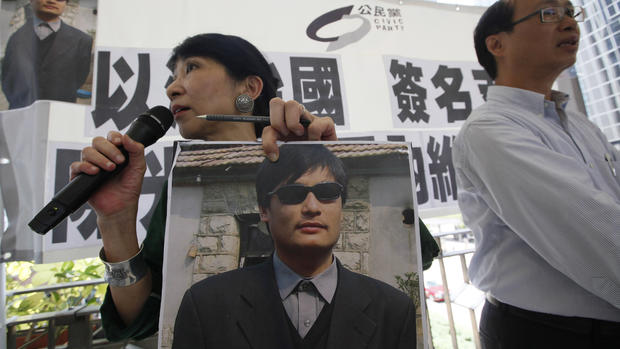China dissident behind standoff known as idealist
On Wednesday, Chen's sixth day in hiding at the U.S. Embassy, he decisively said "zou ba," which means "let's go" in Mandarin Chinese, when asked a third time whether he was ready to leave, according to U.S. Ambassador to China Gary Locke. Two days later, after Chen pleaded to Congress and to reporters his desire to leave the country, China and the U.S. appear to have worked out a deal that would allow Chen to leave his homeland with his family for a fellowship at an unnamed American university.
Tentative deal reached allowing Chen into U.S.
Clinton cites progress in Chinese activist's case
Gibbs: U.S. has "genuine concern" for Chen's safety
Chen realized he wanted to leave China after the ambassador, along with an entourage of embassy personnel, escorted him Wednesday to a local hospital where his wife, two children and a flurry of press greeted him. By nightfall, he was alone, left with the company of his family but no American presence.
Many wonder why Chen opted to stay in China and not, according to U.S. officials, ask for asylum during his stay at the embassy. Chen's friends describe him as an idealist. Perhaps, at one point, he felt that he could achieve the perfect outcome: Change the system, seek a higher education and, most importantly, live freely in the country that he calls home.
His idealism is not far-fetched. This is a man who's beaten the odds time and again. The youngest of five boys, Chen was blinded by a fever in infancy due to the lack of proper medical facilities and treatment in China's rural areas. At 27, Chen could only study at two universities in China that were designated for the blind.
Though Chen never received a law degree, he began to take an interest in defending the rights of people with disabilities. He ran a petition to shut down a toxic paper mill owned by a party official that poisoned fish and crops. He worked with a British aid agency to construct a well. In 2003, he was invited by the State Department in an exchange program visiting several cities.
Chen quickly came to the limelight in 2005 when he began to challenge China's austere one-child policy, which had been enacted to curb the country's growing population. He and his wife Yuan Weijing began taking notes from villagers who were victims of forced sterilizations and abortions, angering local officials in Linyi county. After Chen refused negotiations with local officials, Linyi authorities placed him under house arrest that September. Nearly a year later, in August 2006, Chen was sentenced to more than four years in prison. After his release, in 2010, Chen was once again placed under house arrest.
Chen's supporters have accused authorities guarding his home of harassing Chen and his family. After he and his wife released a video and a letter detailing their detention, officials responded by allegedly beating Chen and his wife and cutting off the electricity, ceasing communication between him and the rest of the world, according to Chen's supporters.
But Chen managed to escape and, depending whether Friday's deal holds together, may receive the ideal ending after all.
